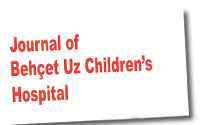Ethical Sensitivity Levels of Pediatric Nurses and The Factors Affecting This SensitivityArzu Tazegün1, Ayda Çelebioğlu21Bartin University Health Services Vocational School, Bartın, Turkey
2Atatürk University Faculty Of Health Sciences, Nursing And Child Health Department, Erzurum, Turkey
INTRODUCTION: This study aims to identify the ethical sensitivity levels of pediatric nurses and the factors affecting this sensitivity
METHODS: Without choosing a sample group from the population, the study was carried out with 120 pediatric nurses who accepted to participate in the study in Erzurum. The data is collected via the Socio-Demographic Data Form prepared by the researchers and Ethical Sensitivity Scale. Percentage distribution, average, Kruskal-Wallis, Mann Whitney U tests, t-test and Dunn test were used in evaluating the data.
RESULTS: The average of the total points that nurses got from ethical sensitivity scale was found as 93.80±19.10. It was also found that the age of the nurses affected the Autonomy and Orientation sub-dimensions and Ethical Sensitivity Total Point in the perception of ethical sensitivity. It was revealed that marital status had an impact on providing benefit and application sub-dimension points of the scale while educational background had an impact on autonomy and providing benefit points. It was found that the ethical training of nurses after graduation had an impact on application sub-dimension while the existence of an ethical committee in the institution they work for had an impact on providing benefit and conflict sub-dimensions.
DISCUSSION AND CONCLUSION: The findings of this study revealed that the ethical sensitivity levels of nurses were lower than the ethical sensitivity levels in many previous studies and some factors were effective.
Keywords: Pediatric nurse, ethic, ethical sensitivity, influencing factors.
Çocuk hemşirelerinin etik duyarlılık düzeyleri ve etkileyen faktörlerArzu Tazegün1, Ayda Çelebioğlu21Bartın Üniversitesi Sağlık Hizmetleri Meslek Yüksek Okulu, Bartın
2Atatürk Üniversitesi Sağlık Bilimleri Fakültesi, Çocuk Sağlığı Ve Hastalıkları Hemşireliği Ana Bilim Dalı, Erzurum
GİRİŞ ve AMAÇ: Araştırma, Çocuk hemşirelerinin etik duyarlılık düzeylerini ve etkileyen faktörleri belirlemek amacıyla yapılmıştır.
YÖNTEM ve GEREÇLER: Evrenden örneklem seçme yöntemine gidilmeden, Erzurumda araştırmaya katılmayı kabul eden 120 çocuk hemşiresi ile yürütülmüştür. Veriler; araştırmacılar tarafından hazırlanan Sosyo-Demografik Veri Formu ve Etik Duyarlılık Ölçeği ile toplanmıştır. Verilerin değerlendirilmesinde; Yüzdelik dağılım, ortalama, Kruskal-Wallis, Mann-Whitney U, t testi ve Dunn testi kullanılmıştır.
BULGULAR: Hemşirelerin, etik duyarlılık ölçeğinden aldıkları toplam puan ortalamalarının 93.80±19.10 olduğu belirlendi. Hemşirelerin yaşlarının Otonomi ve Oryantasyon alt boyutları ile Etik Duyarlılık Toplam Puanını etkilediği saptandı. Medeni durumun ölçek alt boyutlarından yarar sağlama ve uygulama puan ortalamaları üzerinde, öğrenim durumunun da otonomi ve yarar sağlama puan ortalamaları üzerinde etkili olduğu bulundu. Hemşirelerin mezuniyetten sonra etik ile ilgili bir eğitim alma durumunun uygulama alt boyutu, çalıştıkları kurumlarda etik komite bulunma durumunun ise yarar sağlama ve çatışma alt boyutu üzerinde etkili olduğu saptanmıştır.
TARTIŞMA ve SONUÇ: Bulgular, hemşirelerin etik duyarlılık düzeylerinin bundan önce yapılmış olan çoğu çalışmada saptanan etik duyarlılık düzeylerinden daha düşük olduğunu ve bazı faktörlerin etik duyarlılık düzeyini etkilediğini göstermiştir.
Anahtar Kelimeler: Çocuk hemşiresi, etik, etik duyarlılık, etkileyen faktörler
Arzu Tazegün, Ayda Çelebioğlu. Ethical Sensitivity Levels of Pediatric Nurses and The Factors Affecting This Sensitivity. J Behcet Uz Child Hosp. 2016; 6(2): 97-102
Corresponding Author: Arzu Tazegün, Türkiye |
 (67 accesses) (67 accesses)
 (4992 downloaded) (4992 downloaded)
|
|





